Today’s analysis is all about The Change-Up, the R-rated raunchy comedy starring Jason Bateman and Ryan Reynolds.
It only made $37 million at the US box office, which is why it qualifies for Scribe Meets World latest feature, Box Office Blues, where I take a look at why some movies underperformed at the box office and how you can avoid the same pitfalls.
The comedy’s poor showing at the box office is surprising. Its stars are funny, not to mention good looking. It was written by Scott Moore and Jon Lucas, the screenwriting duo behind the comedy juggernaut, the Hangover. That’s not all. The Change-Up was also directed by David Dobkin, who also did a little movie called Wedding Crashers…the number one R-rated comedy–until the Hangover crashed the Wedding Crashers’ box office party.
This is quite the comedy screenplay pedigree, on par with having the Coppolas involved in your drama script. But somehow, The Change-Up, a comedy where family man and lawyer Dave (Jason Bateman) switches bodies with his slacker best friend Mitch (Ryan Reynolds) didn’t heat up the box office, despite a premise ripe with the potential for comedy gags.
If you’re aiming to break into Hollywood with your own R-rated comedy, you’ll definitely want to know why. Let’s take a look:
There is a ceiling on the gross factor
Raunchy comedies are all the rage. Starting with Wedding Crashers, sustained by the Hangover, and now renewed by the success of Bridesmaids, it seems like audiences have not tired of them. But if you’re writing gross-out gags in your comedy screenplay, hoping to push your script into this not-so-hallow sub-genre, remember that your audience most likely has some snacks and soda in their obese little paws.
*Before you read this sentence, put down any food/drink you have in your hands.* At the very beginning of The Change-Up, maybe three minutes into the movie, we saw one of Dave’s babies squirt the contents of her bowels into Dave’s mouth. That was not funny. That was disgusting.
*Resume eating now.* I fortunately didn’t have any snacks in my hands when I started this rental. I weep for the poor fellows with finely tuned gag reflexes who sat down in theater seats, cradling large tubs of popcorn, king-sized bags of gummy worms, and tankards of soda. I would guess that more than a few people in the audience rushed out of their seats, feeling like they were about to vomit…and never returned to the theater.
The moral of this sad digestive tale is that yes, there can be too much grossness, even in a raunchy comedy. If you’re going to be super-gross, wait until the second act, when the tide in the popcorn tub is low. Even then, don’t write a scene where we can see gross bodily fluids make contact with someone’s mouth. If you must, you can hint at it, but don’t show it.
The food poisoning scene at the bridal gown store in Bridesmaids is a good example of how to do gross right. It’s after the first act when much of the movie-goers’ candy has been consumed. We didn’t see all of the bodily fluids involved, just the vomit–and that vomit went into Wendi McLendon-Covey’s blond ringlets, not her mouth.
Only villains can be cruel to children
I can’t think of a single situation where it is a good idea for your screenplay characters–with the exception of the villain–to be cruel to a kid. And by kid, I mean baby, toddler, and pre-teen. It’s akin to “killing the dog”. (If that seems cryptic, check out screenwriting tip #2 from 8 Screenwriting Tips from Taken.)
At the beginning of The Change-Up, Dave enters his nursery, and sees his infant son banging his little head against the crib in a fine imitation of a WWE wrestler. Dave’s reaction? “I thought we had a talk about that, kid.” This line was supposed to be funny–and it does reflect the keystone of comedy: using reversals to generate laughs, which is humor secret numero uno in How to Write a Comedy Script: Lessons from the Hangover.
Why doesn’t this reversal work? Probably because the baby could be causing real injury to himself and only a worthless parent would make light of it. When I saw this scene, I wasn’t thinking “Dave sure is a funny guy.” I was thinking, “someone should examine the baby’s head–and Dave’s too.” A quick scan of negative reviews on Amazon revealed I wasn’t the only one who felt that way.
The timing of the scene was also unfortunate because it made the audience disengage with Dave’s story early on. The guy didn’t have to be a walking Father’s Day card, but few, if any, movie-goers are going to care about the story of someone who abuses his children.
If part of the comedy in your script comes from parent-baby interactions, you can still employ the principle of reversal. Parents can treat their children like adults, but in a way where the kid won’t really be aware of, or affected by, what’s happening. A good example of this is the Friends episode, “The One with Ross’s Inappropriate Song” where Ross and Rachel sing Sir Mix-a-Lot’s classic, Baby Got Back, to their baby Emma.
While parents might be considered irresponsible for singing this song to their pre-teen daughter, they can get away with singing it to a baby, since the baby doesn’t really know what she’s listening to and won’t develop weird body issues afterwards. There are probably thousands of cognitive-linguistic studies to say otherwise, but no one in your audience is reading the Handbook of Clinical Linguistics.
Curse words are the refuge of the lazy
Perhaps you’ve decided that writing an R-rated comedy is your ticket to riches and fame. And to really get that raunch meter high, you decide that your characters should have a doctorate in vulgarity.
But sprinkling the f-word throughout your comedy screenplay doesn’t equate with more laughs. It equates with laziness. Instead of taking the time to think of creative ways for your characters to react to their particular situation, you picked an old standby.
The consensus in screenwriting circles seems to be that you should use profanity in your script if it would make sense for your characters to speak that way. But if you go too far, your audience will develop f-word fatigue and tune out. That certainly seemed to happen in The Change-Up as Dave, and especially Mitchell, cursed their way through three acts.
Com’on. You know you’re better than that.
If your audience can spot your comedy gags a mile away, Houston’s got a problem
Early on in The Change-Up, Mitchell proudly tells Dave he landed a breakout acting role. The minute he said it, I knew exactly where this setup was going. Later, Dave-as-Mitchell appears on set…and supposedly hilarity ensued. Okay, the scene did have some funny surprises, but overall it was very predictable, right down to the Eastern European director.
Remember how throughout the movie Mitchell (or Dave-as-Mitchell) would play around with a samurai sword? Wouldn’t the movie have been more fresh (but less raunchy), if Mitchell had booked a role on an historical epic in the vein of Gladiator or Braveheart? And poor inexperienced Dave-as-Mitchell makes a complete and utter fool of himself as he tries to master battle techniques?
If you did some research on how battle scenes are staged, I’d bet you’d find plenty of nuances which could be exploited to create comedic gags that would have been 100 times more unique than the “lorno” route.
Dave’s profession, a lawyer, wasn’t very original either. But at least Dave was trying to make partner, which increased the stakes in the movie…whereas there were no stakes involved in Mitchell’s acting role. If Dave-as-Mitchell fails, what’s the big deal? Mitchell will go back to being a wannabe B-list actor who lives off of his dad. (I’ve got more to write about the importance of stakes in your screenplay, but I’ll save that for a future post.)
Go for the less obvious joke in your comedy script. I know that Scott Moore and Jon Lucas know how to find a fresh take–they demonstrated that amply in The Hangover. You can see a glimmer of it in The Change-Up. The scene where Mitchell-as-Dave thinks he’s going to be sleeping with Dave’s wife–but then is greeted by a most unpleasant surprise.
That was funny, that was a good reversal…that was revealed in the trailer, unfortunately. If the movie had more of those kinds of surprise reversals–which weren’t given away in the trailer–it would have been a lot more successful.
Comedy is caring
Characters come first, no matter the genre of your screenplay. Liberally sprinkling explosions into your action movie won’t necessarily make it a hit. Neither will stringing together gags in a comedy script. Whether you’re writing a drama, comedy, or thriller, the audience must care about your characters. Otherwise they won’t care about their mission, quest, journey…whatever you want to call your protagonist’s progression through Act Two.
Successful movies like Sherlock Holmes, Taken, Notting Hill, and Back to the Future have followed this principle, while the ones which have disregarded it, have so far been analyzed in the Box Office Blues category. Comedy writers are usually the ones who try to ignore this rule, mostly because they think they can get away with it by distracting everyone with comedy set pieces.
But gags are not enough to captivate someone’s interest for 90 minutes. To get a quick (and free) laugh, all they have to do is visit YouTube.
Movie-goers who have paid at the very least $10 to see your movie, are seeking something more. They are coming not just for a laugh but for a story. They want encouragement, catharsis, or transformation.
They didn’t get that by watching Dave and Mitchell’s body-swapping antics. It was hard to care for Mitchell who was like a hyperactive Elmo toy accidentally manufactured with a potty mouth. It was easier to care about Dave’s plight, as we watched him struggle to balance his family life with his professional one.
Towards the end of the second act, Dave’s wife tells Dave-as-Mitchell that Dave is a workaholic because he didn’t have much growing up. So he worked and worked, trying to prove himself and provide for his family…but nothing is ever enough for him.
In pursuit of professional greatness, he basically has ignored his wife. Even though her speech was basically one unending reel of exposition, it struck a chord with me. I empathized with Dave, and I wanted to see him achieve professional and personal balance.
However, that moment came TOO LATE. It should have happened in the first act, as we’re being introduced to Dave’s life. It’s the type of backstory which gets the audience in sync with Dave so that they will want to watch his story unfold till the very end.
If you get your audience to invest in your characters at the very beginning of your screenplay, they will be much more forgiving of detours and mis-steps later on. Believe me, that kind of goodwill is priceless.
Final thoughts
Scott Moore and Jon Lucas are funny guys, and their grasp of screenplay structure is enviable. Their version of The Change-Up had a lot of potential, and just needed a few edits to make it as fresh as their greatest hit, The Hangover.
There’s a larger lesson to be learned here which has nothing to do with comedy writing but everything to do with success. If I’m remembering the details correctly, Scott Moore and Jon Lucas sold The Change-Up after they hit it big with the Hangover.
Your big break into Hollywood might be on a smaller scale than penning the number one R-rated comedy of all time. Even so, when your break comes–and it will, if you have a modicum of talent and a reservoir of persistence–be prepared.
Make sure you’ve got polished scripts waiting in the wings, or a the very least, premises for potential blockbusters. You could be selling them for a cool six figures–or more.
May all your screenplay sales be box office success stories!
Change direction by Phil Whitehouse
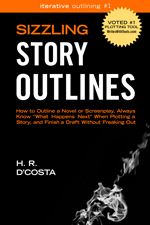










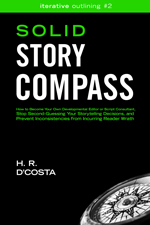
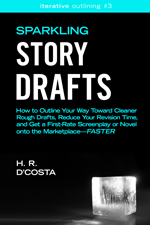
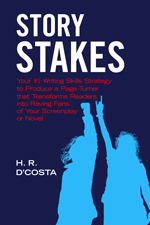
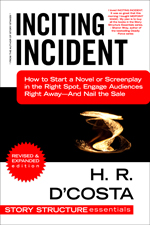
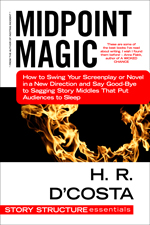


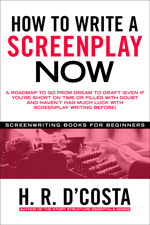


Comments on this entry are closed.
I enjoyed the comments, but how do you portray a guy who is determined to drive up the ladder to success like tom Hanks in “Nothing in Common” and make him likeable at the same time? Can a charchter be a bit arrogant and likeable at the same time?
Hi Lew,
I haven’t seen Hanks in Nothing in Common, but I think you can definitely make your hero likeable and arrogant at the same time. Margaret from The Proposal is a great example. She’s arrogant, sure. But she’s also likeable because she’s very competent at what she does. Contrast Margaret with her underling, Bob, (a hilarious cameo by Aasif Mandvi).
He’s pompous, but he isn’t actually competent. Margaret fires him because he couldn’t do the task she assigned to him (although she accomplished it herself with little difficulty). She even gives Bob two months to get his affairs in order and encourages him to tell everyone he resigned. Things go south though when he doesn’t take it well.
If you show that your character has good reason to be arrogant–then your character’s arrogance won’t grate so much. Good luck!